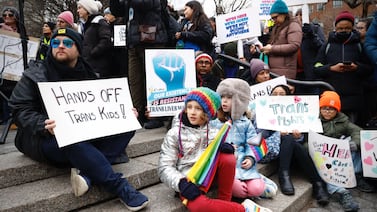Sign up for Chalkbeat Detroit’s free daily newsletter to keep up with the city’s public school system and Michigan education policy.
Advocates for Michigan’s early childhood education centers called on lawmakers to strike language in proposed budgets that they say would force community-based providers to close and worsen the state’s child care crisis.
At issue are competing budgets in the state House and Senate. In the House, lawmakers deleted language that assure 30% of funding for the state’s free preschool program — Great Start Readiness Program, or GSRP — is set aside for community-based, or private, providers. In the Senate, that language remains, but lawmakers included a requirement that salaries for teachers in community-based GSRP programs cannot be lower than the average salary for GSRP teachers in the region.
Both moves would put financial pressure on private child care providers, albeit in different ways, at a time when many families struggle to access affordable and convenient programs.
“This proposed legislation will absolutely decimate the sector … and turn back the dial on progress,” said Chana Edmond-Verley, CEO of Vibrant Futures, a child care advocacy organization in Grand Rapids.
Gov. Gretchen Whitmer’s budget proposal would make the GSRP available for all Michigan 4-year-olds, regardless of family income. It is operated by public and private organizations.
The legislative proposals are not aligned with Whitmer’s budget blueprint, which maintains the 30% allocation and has no language about pay parity.
Edmond-Verley and others drew attention to the proposed changes during a press conference Tuesday in Lansing.
“In these budget proposals, we face a loss of funding and mandates that will decrease availability and increase the cost to families at a time when Michigan is already experiencing a child care crisis,” said Marcus Keech, director of government affairs at the Grand Rapids Chamber.
Both the House and Senate have approved budgets for the fiscal year that begins July 1. Conference committees are slated to resolve differences between the budgets. The advocates who spoke Tuesday say they hope lawmakers will make changes to the GSRP language in those committees.
Michigan, like many states, is struggling to ensure children have access to quality early childhood programs. A 2022 MuckRock investigation concluded Michigan’s child care system was in crisis, with far more so-called deserts — areas of the state where demand far outweighs available slots — than policymakers had estimated.
Meanwhile, the loss last year of federal COVID relief funding that helped many centers stay afloat during the pandemic raised concerns about the stability of the early childhood system. Staffing challenges have also made it difficult to hire staff, and low wages have providers competing with other industries for workers.
The Senate proposal that would require comparable pay for GSRP teachers attempts to address the pay issue by ensuring teachers in private programs are paid similar to what those in public school programs make. Keech said that doesn’t address “the funding strings that factor into each facility’s pay structure.”
“We are holding private providers to the same level of expectations as a facility that receives funding from local and state tax revenue,” Keech said.
Matt Gillard, president and CEO of Michigan’s Children, said advocates want to see higher pay for child care workers.
“It’s not a level playing field,” Gillard said. “If we’re going to ask a community-based organization in a certain community to be able to pay as much as their public school system, it’s just not the reality of where we are. We could do that with a lot more public investment. But that’s not on the table.”
Lori Higgins is the bureau chief for Chalkbeat Detroit. You can reach her at lhiggins@chalkbeat.org.







